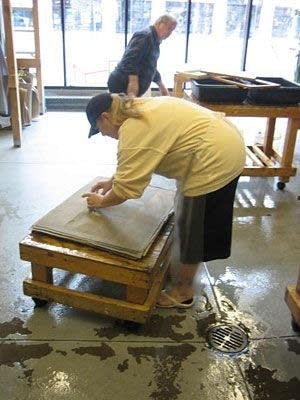Combat Paper: finding new life in the garments of war

For many military veterans, it can take years, even decades, to deal with the emotional trauma incurred during their service.
A new program is helping them put their experiences into words and down on paper. Not just any paper - these sheets are made from their old military fatigues.
[image]
Theresa Ash and Tim Rooney pull sheets of paper at the Minnesota Center for Book Arts
Create a More Connected Minnesota
MPR News is your trusted resource for the news you need. With your support, MPR News brings accessible, courageous journalism and authentic conversation to everyone - free of paywalls and barriers. Your gift makes a difference.
The workshop, which takes place at the Minnesota Center for Book Arts, was inspired by the work of Drew Matott and Drew Cameron, who brought their "Combat Paper Project" on tour to the Twin Cities back in the fall of 2009.
Over the past several weeks, a half-dozen veterans of the first Gulf and Vietnam wars cut their uniforms down into small squares, placed them in what's called a "beater" with water and literally beat the fatigues to a pulp.
Layne Beckman served as a combat flight nurse in the first Gulf war. She said cutting up such a potent souvenir of her service was an emotional experience:
The first couple of cuts were really hard, but after that it was pretty therapeutic. Ripping them up was powerful. Then making the paper was kind of calming when I saw these perfect sheets come out. I can only describe it as a really sweet moment.
[image]
Former combat flight nurse Layne Beckman shows off the two journals she's made with her old fatigue pants.
This papermaking workshop is just one of several classes offered by Veterans in the Arts, which collaborates with Twin Cities arts institutions such as the MCBA, Northern Clay Center, Highpoint Center for Printmaking and The Playwrights' Center.
Veterans in the Arts President Suzanne Asher (U.S. Air Force, 1979-1983) says all military veterans residing in Minnesota qualify to participate in the program, although classes are currently limited to the Twin Cities metro area.
We want to make use of the highest quality studio arts experiences so that the veteran is technically and intellectually supported in ways that are commensurate with the depth of their personal experiences.
Asher says the long term goal is to have a community of veterans doing art, supporting one another and hosting an annual exhibition.
[image]
From military uniform to handmade paper
Theresa Ash and her husband Michael both served in the military, as did their daughter Amanda and son Jake. The parents have used the workshop to make paper from each of their four uniforms. Ash says she and her daughter never saw combat, but her husband and son did. When asked how that affects the quality of the paper, she responds, "On a physical or an emotional level?"
On a physical level it's neither here nor there - it doesn't matter to me. But when I look at the paper that came from son Jake's uniform - a uniform he was wearing when he saved a Canadian solider... I'm so protective of that paper. The blood, sweat, tears.. the oil and the sand - it's still in there. You just don't get that out.
Chante Wolf agrees. A veteran of the Air Force, she says: "If you want to see me go ballistic - mess with my paper."
Wolf sits on the board of Veterans in the Arts, and is participating in the "Combat Paper" course for the second time. "It's cheaper than therapy," she quips.
There is a magical transformation and healing that takes place. It doesn't happen overnight or when the project is done, but just the beginning of a process of healing and reconciliation, and sharing.
I believe it is through the sharing with others that the deepest part of the healing and reconciliation can take place. It is through the stories of others that we learn, and hopefully change a direction with our own lives.
[image]
One of Layne Beckman's finished journals
Most of the veterans in this class are using their paper to create journals, in which they will write about their experiences in the military, in combat and here at home. For Layne Beckman, it's an exciting time.
I haven't told my story. It's only in the past year I've been able to start talking about it.
As for Theresa Ash, she says her family's journals will be "history books that politicians can't rewrite."
While the course is obviously popular with the veterans who have participated in it, enrollment in the overall program hasn't been that high. Some think it may be due to a lack of awareness of the program, which is relatively new and funded by Minnesota's Clean Water Land and Legacy Amendment.
Or perhaps it's a matter of people being ready to confront and process the lasting impact of their service. The veterans in this class served 20 years ago or more, yet for many of them the wounds are still fresh.